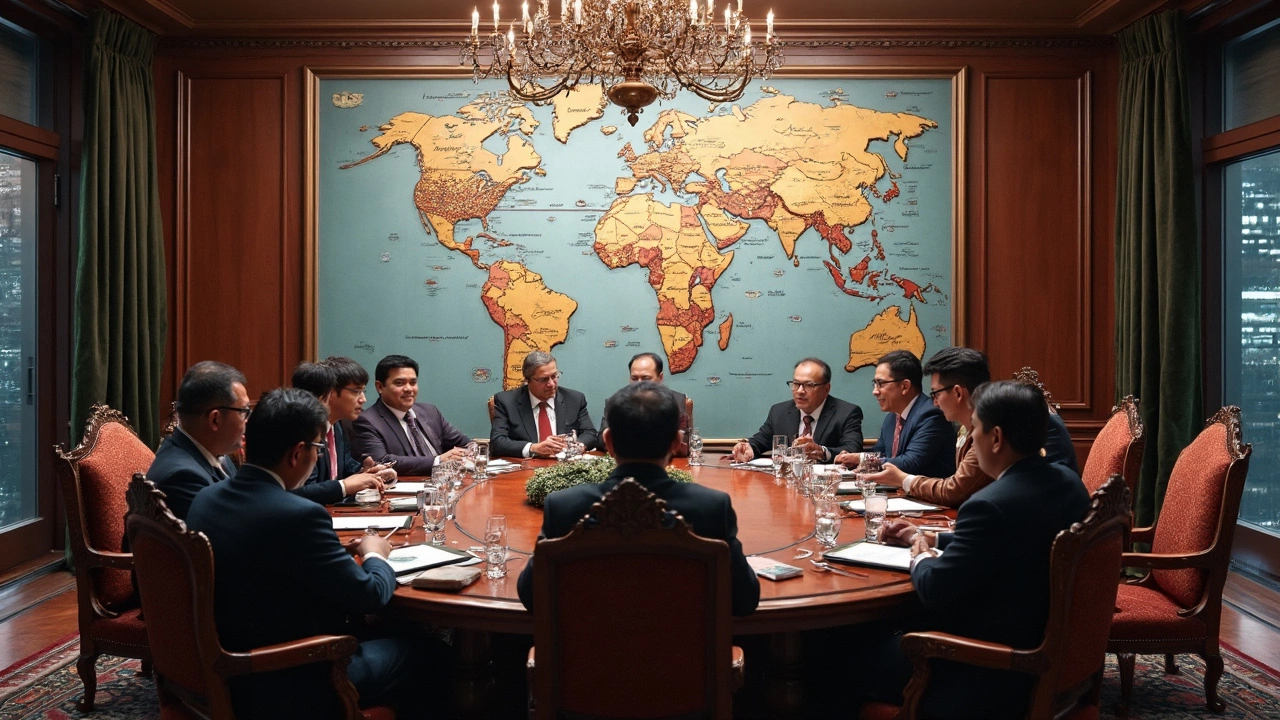 Feb, 15 2025
Feb, 15 2025
India has become a powerhouse in the pharmaceutical world, and it's no surprise that some of its industry leaders have reached billionaire status. The Indian pharma sector is vast, with a rich history of innovation and a strong global presence. But who exactly are these billionaire tycoons steering the ship?
Let's talk about the likes of Dilip Shanghvi from Sun Pharmaceuticals and Cyrus Poonawalla of the Serum Institute of India. These are just a couple of names that pop up when you delve into the world of Indian pharma billionaires. Their companies aren't just big players in India; they've made waves around the globe.
The rise of these pharma giants wasn't an overnight success. It involved years of strategic planning, research, and understanding of the market dynamics. The journey of India's billionaire pharma folks is as fascinating as it is inspiring, showing how determination and a focus on innovation can lead to success on a colossal scale.
- Rise of Indian Pharma Giants
- Meet the Billionaire Pharma Players
- Factors Behind Their Success
- Impact on Global Healthcare
- The Future of Indian Pharma
Rise of Indian Pharma Giants
The story of India's high-flying pharma industry is nothing short of fascinating. It all began back in the 1960s when India made a conscious effort to transition from importing medicines to producing them locally. The country's move to produce affordable generic drugs played a big part in the growth of pharma manufacturers in India.
Early Days of Expansion
During the 1970s and 1980s, Indian pharma companies worked tirelessly to develop the capability to reverse-engineer patented medicines. This allowed them to produce cost-effective alternatives, earning them a reputation as the 'pharmacy of the world.' It was during this time that companies like Cipla and Dr. Reddy's Laboratories started gaining momentum.
In the following years, the legal landscape changed with the implementation of the Patents Act of 1970, which was pivotal in allowing domestic players to thrive. This act supported the rise of Indian pharma industry by removing patent restrictions on drugs, providing a competitive edge to local firms.
Going Global
As we rolled into the 1990s and 2000s, Indian pharma giants started spreading their wings overseas. They began exporting generic drugs to international markets, including the United States and Europe. The industry's competitive edge in cost-effective R&D and manufacturing became a strong point.
Top pharma companies like Sun Pharmaceuticals, founded by Dilip Shanghvi in 1983, capitalized on this momentum. They entered regulated markets and forged partnerships with global pharmaceutical brands, building a solid international presence.
The Present Landscape
Today, India is one of the leading suppliers of generic medicines worldwide, producing over 20% of the world's generic drugs. The industry contributes significantly to global healthcare, providing affordable treatments for various medical conditions. In fact, Indian pharmaceutical exports were valued at around $24 billion in 2022, showcasing an impressive growth trajectory.
| Year | Export Value (in Billion USD) |
|---|---|
| 2010 | 12 |
| 2020 | 20 |
| 2022 | 24 |
The relentless pursuit of innovation and affordability has put Indian pharma on the global map, not only creating billionaire tycoons but also strengthening its position as a key player in international healthcare.
Meet the Billionaire Pharma Players
India's pharmaceutical industry is filled with dynamic leaders who have not only transformed healthcare at home but also made a mark globally. Let’s get acquainted with some of these big names.
Dilip Shanghvi: Sun Pharmaceuticals
Dilip Shanghvi is a prominent figure in the Indian pharma scene. As the founder of Sun Pharmaceuticals, he has shaped the company into the largest pharmaceutical company in India. Known for its generics, Sun has a massive reach, touching patients across the globe. Shanghvi's knack for acquisitions and strategic partnerships has played a significant role in his rise to billionaire status.
Cyrus Poonawalla: Serum Institute of India
When we talk about vaccines, it’s impossible to overlook Cyrus Poonawalla. His Serum Institute of India is the world's largest vaccine producer by volume. They played a crucial role during the COVID-19 pandemic, manufacturing millions of vaccine doses. Poonawalla's focus on affordability and accessibility has been key to their success.
Pankaj Patel: Cadila Healthcare
Pankaj Patel, the brain behind Cadila Healthcare, established a strong presence in both drug manufacturing and biotech research. Cadila’s innovations, ranging from treatments for common ailments to complex biologics, have helped Patel earn his place among India's top pharma billionaires. His focus on research and development continues to drive the company's growth.
Kiran Mazumdar-Shaw: Biocon Limited
Kiran Mazumdar-Shaw stands out not just because she's among the top pharma players, but also as an influential woman in the industry. Founder of Biocon Limited, her leadership has propelled the company to the forefront of biopharmaceuticals, particularly in insulin and cancer treatments. Her commitment to innovation and affordability has made a global impact.
These personalities have turned their vision into reality and significantly contributed to making the Indian pharma industry a global powerhouse. Their stories are not just about wealth but about the profound influence they wield in healthcare. They're shaping today's world and inspiring the next generation of entrepreneurs.

Factors Behind Their Success
When it comes to the meteoric rise of India's pharma manufacturers, a few key factors have set these billionaire players apart from the rest. Understanding these elements offers a glimpse into not only their success stories but also what makes the Indian pharma industry tick.
Innovation and R&D
One of the foremost drivers is a relentless focus on innovation and research. Indian pharma companies like Sun Pharmaceuticals and the Serum Institute have continually invested in cutting-edge R&D. Their ability to pioneer new treatments and medications has given them a competitive edge on the global stage.
Economies of Scale
Many of these billionaires have harnessed the power of economies of scale. By producing a high volume of drugs at a lower cost, they've created efficiencies that enable them to offer competitive pricing. This strategy has opened doors to international markets, further boosting their revenues.
Strategic Acquisitions
Tactical acquisitions have played a vital role, too. Companies like Sun Pharma have acquired businesses in key markets, expanding their reach and enhancing their product portfolios. Such strategic moves have not only bolstered their global presence but also fueled their growth.
Government Support and Policies
The Indian government has actively supported the pharmaceutical industry through favorable policies like tax incentives and research grants. Such initiatives have encouraged homegrown companies to scale up operations and attract international attention, making India a hotbed for pharmaceutical innovation.
Table: Key Stats
| Company | Net Worth (Billion USD) | Global Ranking |
|---|---|---|
| Sun Pharmaceuticals | 3.6 | 104 |
| Serum Institute of India | 12 | 48 |
These factors combined have not only molded the billionaires of the pharma industry in India, but have also positioned the country as a significant player in global healthcare. Their success is rooted in a blend of innovation, strategic growth, and leveraging local advantages—which serves as an inspiring blueprint for aspiring entrepreneurs worldwide.
Impact on Global Healthcare
When it comes to global healthcare, it's hard to overlook the hefty influence exerted by the Indian pharma billionaires. Indian pharma industry giants like Sun Pharmaceuticals and the Serum Institute of India have not only dominated the domestic market but also carved a significant slice of the international pie.
One of the standout contributions has been in the realm of generic medicines. Indian companies have become the go-to for affordable generics, supplying more than 20% of the global generic drug market. This means the Indian pharma sector isn't just a local hero—it's a critical player in making healthcare accessible to millions worldwide.
Leading the Vaccine Charge
The Serum Institute of India under Cyrus Poonawalla deserves a special mention, especially after their pivotal role during the COVID-19 pandemic. As the world's largest vaccine manufacturer, they produced billions of doses, supporting global vaccination drives and contributing significantly to public health.
Innovations and Collaborations
Innovation is another area where Indian pharma giants are making their mark. Sun Pharma and others are investing in R&D, developing new drugs, and improving existing ones. Collaborations with international companies have further strengthened their positions, enabling knowledge transfer and joint ventures.
For example, these partnerships have led to advancements in drug delivery systems, making treatments more effective and reducing side effects. It's this mix of innovation and collaboration that positions the Indian pharma industry as a critical component of global healthcare dynamics.
| Company | Global Contribution |
|---|---|
| Sun Pharmaceuticals | 20,000+ products available worldwide |
| Serum Institute of India | 1.5 billion vaccine doses annually |
In short, the impact is loud and clear—India's pharmaceutical billionaires are not just thriving; they're changing the game in global healthcare, making medicines more affordable and healthcare more accessible across the globe.

The Future of Indian Pharma
As we look into the crystal ball, the future of the Indian pharma industry seems brighter than ever. With a surge in innovation, increasing global demand, and government support, Indian pharma companies are set to play a pivotal role on the international stage. The industry's growth is bolstered by a robust domestic market and an ever-expanding export market.
The Innovation Path
Indian pharma manufacturers are not just about producing generic drugs anymore. There's a strong push towards research and development in biopharmaceuticals, vaccines, and new chemical entities. Companies like Biocon are leading the charge in biopharma, aiming to cater to specific unmet medical needs globally.
Tech Integration
Integration of technology into pharma manufacturing and distribution is another game changer. From AI-driven drug discovery to blockchain for supply chain transparency, the industry is adopting tech innovations at a rapid pace, enhancing efficiency and reliability.
Government Initiatives
The Indian government is actively supporting the pharma sector with initiatives like 'Pharma Vision 2020', aiming to make India a global hub for end-to-end drug discovery. Additionally, policy reforms are focused on boosting local production and easing regulations to foster a conducive business environment.
Opportunities on the Horizon
- Increasing chronic diseases globally present vast export opportunities for Indian pharma manufacturers in the specialty drugs market.
- The COVID-19 pandemic highlighted the critical role of vaccines, with companies like the Serum Institute of India setting benchmarks for others to follow.
- Growing demand for affordable medication in developing markets continues to pave the way for Indian companies to expand their footprint internationally.
The statistics are promising. A recent report indicates that the Indian pharma market is expected to reach $130 billion in value by 2030, riding on a compound annual growth rate of 12%. With such potential, the future of Indian pharma surely holds exciting prospects for both industry leaders and consumers worldwide.